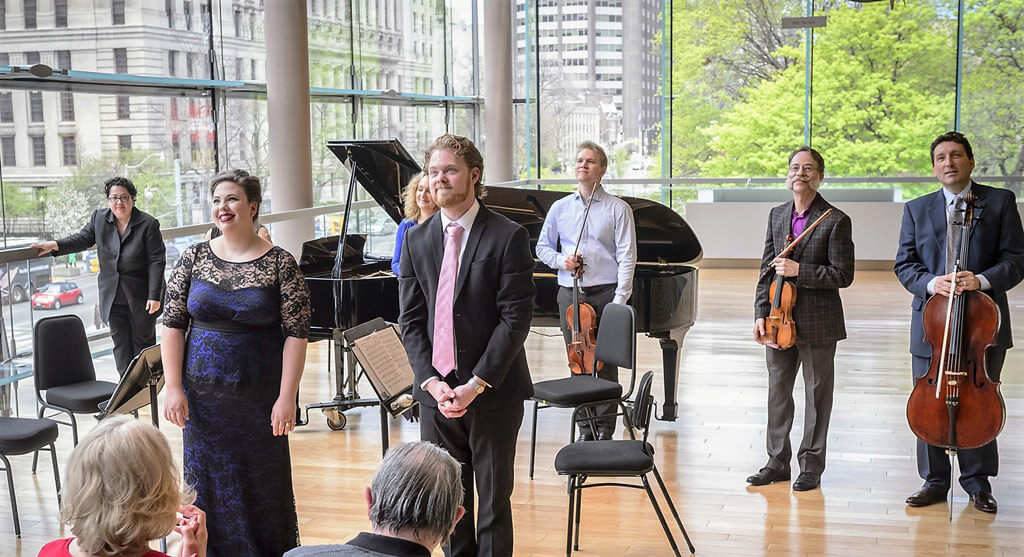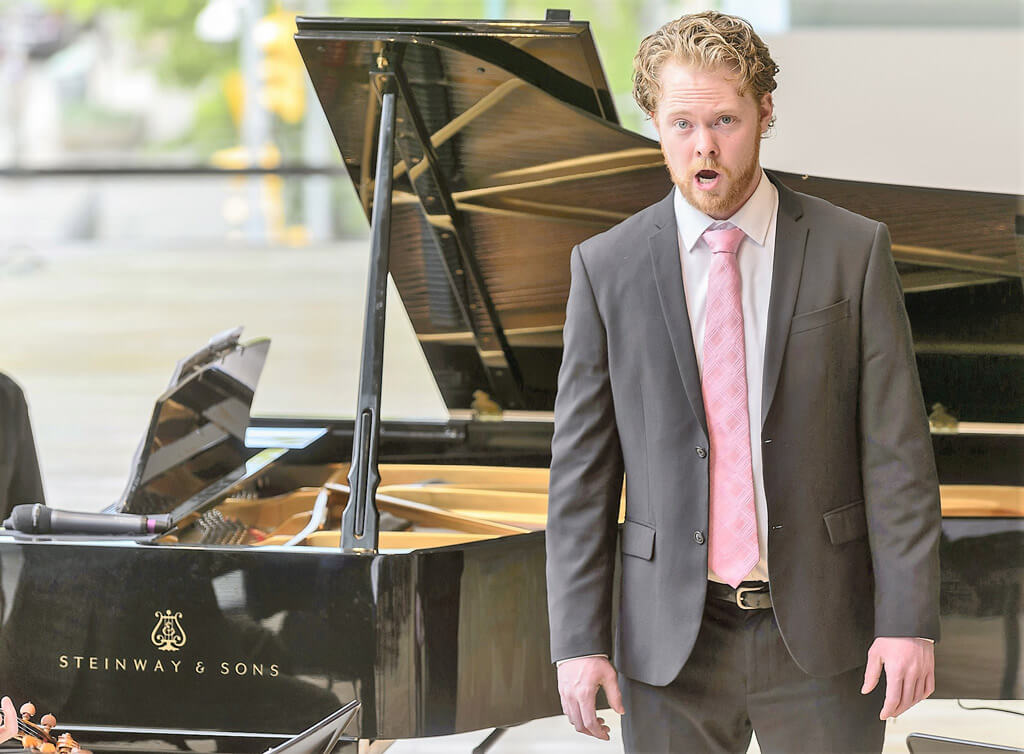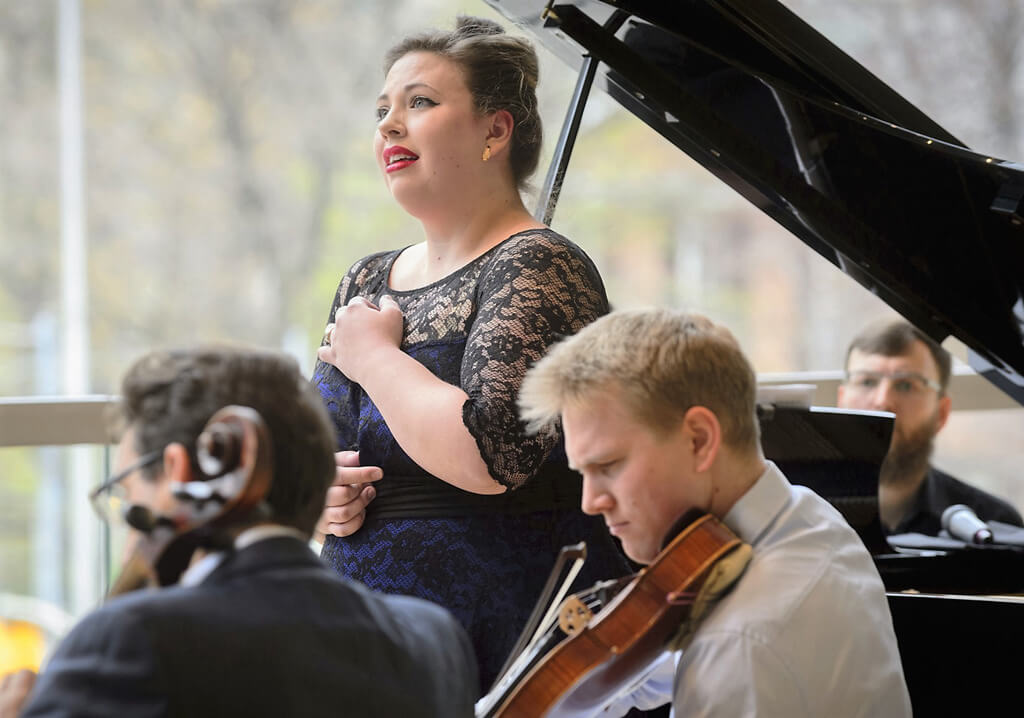
COC Ensemble Artists with Aviva Fortunata (soprano) and Iain MacNeil (bass-baritone) at the Richard Bradshaw Amphitheatre. May 10.
“Zu neuen Taten, teurer Helde” – Wagner Götterdammerung Prologue, Scene 2
It’s that time of year again. With the opera season winding down, it means a few members of the COC Ensemble Studio are “graduating.” They come into the Ensemble already blessed with beautiful voices and the desire and drive for a career. Now after their tenure in the young artist program, they are fully equipped, nicely seasoned, and ready to strike out on their own to forge a career in the opera world. It always reminds me of the Prologue in Götterdammerung, when Brunnhilde lets Siegfried go to conquer the world. Yes, I’m very sad to see our singers go. But given their talent, they will need to go out into the opera world to make their mark. I’ll bet we’ll hear from them again.
Today, soprano Aviva Fortunata and bass-baritone Iain MacNeil gave a farewell noon hour concert at the Richard Bradshaw Amphitheatre. This was their last concert as members of the Ensemble. On the program were two of my desert island song cycles – Ralph Vaughan Williams’ Songs of Travel, and Richard Strauss’ Vier letzte Lieder. At the piano was Liz Upchurch, head of the Ensemble Studio, and Hyejin Kwon, an Ensemble Studio pianist. This was a special concert because the two cycles have new arrangements for piano quintet by Canadian composer John Greer, who was in attendance. These free noon hour concerts are almost always full, but today it was beyond packed. I understand people were turned away – too bad! As is usual practice, both MacNeil and Fortunata spoke briefly to the audience. They expressed their gratitude to the COC for their time in the Ensemble, thanking the administration, the coaches, mentors and colleagues, and the audience.

MacNeil kicked off the recital with the Vaughan Williams song cycle. Composed between 1901 and 1904 for the baritone voice and set to text by Robert Louis Stevenson, this cycle of nine songs are often considered to be the “English answer” to Die Winterreise and Lieder eines fahrenden Gesellen, all three cycles I learned as an undergraduate music student. Perhaps it’s the familiarity with the English language, I’ve always found the Vaughan Williams cycle particularly endearing, however much I love the Schubert and the Mahler. The text by Stevenson is brilliantly evocative. The first songs are happy and carefree, and then the cycle turns dark. For those of us who’ve spent their lives away from home, this cycle has special resonance. “Whither must I wander” in particular has an unbearable poignancy. I’m also very fond of “Bright is the ring of words,” which happens to be the title of the song text anthology by Philip Miller, the required text for my first course on Song Literature oh so many years ago. Anyway, I digress…
Iain MacNeil sang these nine songs with an uncommon beauty of tone and heartfelt expression. His virile and smooth baritone, a tad covered in timbre but totally secure and evenly produced, never sounded better. I liked his attention to the text. I found myself in tears during “Wither must I wander.” I’ve heard this cycle in performance countless times in venues big and small, perhaps 40, 50 times in nearly as many years, from conservatory students to some of the greatest singers the likes of Thomas Allen and Gerald Finley. MacNeil sang it as beautifully as anyone I’ve heard. This baritone has developed tremendously in his time in the Ensemble. Perhaps in his first year he was a bit overshadowed, but this year he came into his own. I enjoyed his Figaro, and now this recital re-affirmed that Iain MacNeil is a singer to be reckoned with. I can see a Billy Budd in his future. I have heard these songs mostly with piano, and sometimes with orchestra, but I prefer the piano for its austerity. To my own surprise, I find the piano quintet a perfectly fine option. Greer’s scoring is light and unobtrusive, allowing the music to speak for itself.
The recital concluded with the Four Last Songs by Strauss. Truly this song cycle is Strauss’ gift to the soprano voice. It represents the composer at his most magical – it’s the song cycle to end all song cycles. The so far* exclusive domain of the soprano voice, it requires a full lyric or lirico-spinto, with the requisite beauty of tone, splendid top, rock-solid legato, plenty of chiaroscuro, and perhaps most important of all, a long breath line to do the long phrases full justice. I am happy to say Aviva Fortunata sang it very beautifully. First of all, her voice has the right weight and timbre for this cycle. Right off the bat, “Fruhling” has a very high tessitura with long, arching phrases. Fortunata tackled it nicely with rich, refulgent tone and ample breath! “September” is equally demanding, with a long phrase on the word “blumen” that sits low in the soprano range that often gives the singer trouble. Aviva did it marvellously.

The third song, “Beim schlafengehen” is perhaps the most transcendent of all. I love the brilliant arrangement by Greer for the opening, from cello to piano to viola to second violin and finally to first violin – bravo! The most magical section is the violin solo, another tear-jerking moment. The sound made by the violin has to appear as if it comes out of nowhere, like the soul rising to heaven. Here Marie Berard, the COC Concertmaster, played it nicely. This was followed by arguably the most difficult passage for the soprano, several long, arching phrases up to a B natural and then drops to the lowest part of the soprano range, a line that has defeated many a great singer in the past. Impressively, Fortunata did it with rich, opulent tone and with plenty of breath.
The cycle concluded with “Im Abenrot.” Here for the first time, I missed the orchestra. The opening orchestral introduction requires a big sound and it’s simply not possible to get that full-bodied sound from a piano quintet, no matter how good the arrangement. The very slow ending also poses a challenge to the chamber ensemble. The piano and first violin made a valiant effort to sustain the line, but it wasn’t easy. Fortunata has the legato for the very slow tempo, one fleeting moment of sagging intonation notwithstanding. I don’t know if it’s her debut in this song cycle, but she should be very pleased. Call me fickle, but I think this is now my favourite concert of the 2015-16 Vocal Series. Bravi tutti!
*German tenor Jonas Kaufmann has announced that he will be singing Four Last Songs in February 13, 2017, as part of his Barbican Residency. Kaufmann is considered the greatest Heldentenor in front of the public today. But tackling VLL for a tenor is something else altogether. I wish him the best!
#LUDWIGVAN
Want more updates on Toronto-centric classical music news and review before anyone else finds out? Get our exclusive newsletter here and follow us on Facebook for all the latest.



